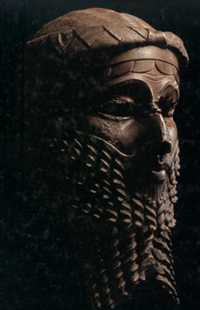|
Akkad
- auch Agade geschrieben -, das erste Grossreich in der Menschheitsgeschichte
im 3. Jahrtausend v. Chr., ist heute (fast) ganz aus dem Gedächtnis
der Menschen entschwunden. Hat sich also der Fluch, der über Akkad
ausgesprochen wurde, erfüllt?
In dem literarischen Werk "Fluch über Akkad " werden Aufstieg und Niedergang der Dynastie der Akkader (ca. 2350-2200 v. Chr.) geschildert. Mit Sargon fängt die Dynastie an. Sargon bedeutet "der wahre König". Das kann nicht sein eigentlicher Name gewesen sein. In späteren Legenden war er der Sohn einer Priesterin, die ihn in einem Bastkörbchen im Fluss aussetzte. 1000 Jahre vor der Moses-Geschichte! Man nimmt an, dass Sargon in einer Palastrevolte den Thron von Kisch eroberte. Man weiss nicht, wann er seine Hauptstadt Akkad gründete, die dem Reich, der Sprache und der Epoche den Namen gab. Zu dem literarischen Werk Nachdem Enlil, der Oberste der Götter, dem König Sargon die Königswürde übertragen hat, bricht für das Reich von Akkad eine Zeit der Blüte und des Überflusses an. Die Bewohner des Landes leben in Frieden und Wohlstand. Der Handel blüht, und die Fremdländer liefern Tribute in grosser Menge. Dies ändert sich unter der Herrschaft des Naram-Sin, Sargons Enkel. Die Göttin Inanna-Ischtar ist Herrin von Akkad. Wahrscheinlich wurde ihr Kult zugunsten des einflussreichen Enlil von Nippur vernachlässigt. Als Reaktion darauf verlässt sie ihr Heiligtum und wendet ihre Waffen gegen ihre Stadt Akkad. Anscheinend erfolgreich, denn in Nippur wird ein zweiter König inthronisiert. Naram-Sin bleibt sieben Jahre untätig. Dann veranstaltet er eine Orakelanfrage, ob er das Enlil-Heiligtum in Nippur wiederherstellen dürfe. Das Orakel erbringt nicht das gewünschte Ergebnis, so dass Naram-Sin zu den Waffen greift und mit einem Heer Nippur überfällt und ausplündert. Enlil, zornig über die Zerstörung seines geliebten Heiligtums, lässt daraufhin die im östlichen Gebirge wohnenden Gutäer in das Land einfallen und es mit Krieg überziehen. In dem einstmals so blühenden Reich von Akkad herrschen nun Unsicherheit und Hunger. Die grossen Götter versuchen, das Herz Enlils zu besänftigen und belegen die Stadt Akkad mit einem schweren Fluch, der die Zerstörung und Verwüstung der Stadt bewirkt. Das Epos endet mit den Worten: "Dafür, dass Akkad vernichtet worden ist, sei Inanna Preis!" Akkad war wohl in späterer Zeit wieder bewohnt, seine alte Grösse erreichte es aber nie mehr. Wo es lag, wissen wir nicht. Bis heute ist Akkad noch unentdeckt geblieben! |
||||||||||||||||||||
AuszügeAfter the frowning forehead of EnlilHad killed (the people of) Kish like the Bull of Heaven, After he had ground the house of Erech (=Uruk) into dust, like a giant bull, After in due time, to Sargon the king of Agade, From below to above, Enlil Had given him lordship and kingship, Then did holy Inanna, shrine of Agade, Erect as her noble chamber, In Ulmash did she set a throne. Like a "little
fellow" building (his) house anew,
In those days
the dwellings of Agade were filled with gold,
In days not
five, in days not ten, ...
(Then) Naram
Sin ... dressed in sackcloth ...
Seven years
Naram-Sin remained firm, ...
Mobilized his
troops,
Naram-Sin plündert Ekur, den Tempel Enlils. Alle Schätze an Gold, Silber, Edelsteinen, die heiligen Gefässe werden ans Licht gezerrt.He docked large boates at the quay by the house, Docked large boats at the quaqy by the house of Enlil, Carried off the possessions of the city, ... Enlil, because
his beloved Ekur had been attacked, what destruction he wrought!
The old women
ceased not (crying) "Oh, my city,"
A second time
did Sin, Enki, Inanna, Ninurta, Ishkur, Utu, Nusku and Nidaba, the great
gods,
"City, you
who dared assault the Ekur - it is Enlil (whom you assaulted),
(And) lo, with
Utu's** bringing forth the day, so it came to pass!
Quelle: Samuel N. Kramer, Sumerian Miscellaneous Texts, in: James B. Pritchard, Ancient Near Eastern Texts Relating to the Old Testament, 3rd edition, Princeton / New Jersey 1969, S. 646-651. *Ashnan ist
die Göttin des Getreides.
|
|||||||||||||||||||||
